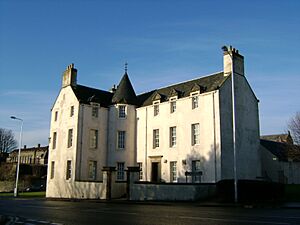James Oswald (elder) facts for kids
James Oswald was an important Scottish politician. He served in the Parliament of Scotland from 1703 to 1707, representing his hometown of Kirkcaldy. Later, he became a member of the House of Commons of Great Britain for the Dysart Burghs.
Contents
Early Life and Career
James Oswald was born in 1650 in Kirkcaldy in Fife, Scotland. His father, Thomas Oswald, was a captain in the merchant navy. James followed his father's path and became a very successful and wealthy sea captain himself.
By 1689, James was a "burgess" of Kirkcaldy. This meant he was a citizen with special rights in the town. He even helped Kirkcaldy by asking the Privy Council of Scotland (a group of royal advisors) to lower taxes. He argued that trade in the town was not doing well, and the taxes were too high.
A Challenging Election
In 1702, James Oswald decided to run for Parliament. At that time, town councils chose their representatives, called "burgh commissioners." The town council of Kirkcaldy met to choose their commissioner. The current commissioner was John Boswell, but Captain James Oswald wanted the job.
A big disagreement started between James Oswald and the Earl of Leven. The Earl of Leven was the "provost" (like a mayor) of Kirkcaldy. This power struggle lasted for almost a year.
Captain Oswald argued that the Earl of Leven should not be part of the election meeting. In return, the provost stopped four of Oswald's supporters from voting. In the election, both Boswell and Oswald received nine votes. However, Oswald's team protested that their four supporters were unfairly excluded.
Later, Henry Oswald (a relative of James) was elected as the new provost, replacing the Earl of Leven. A week after that, the council voted to send Captain Oswald to Edinburgh to claim his seat in Parliament.
However, the Earl of Leven's father was a powerful person in the Privy Council. On November 26, the Privy Council said that the Kirkcaldy council's election was not proper. They even said that Captain Oswald and seven other councillors could not vote in the next election. Captain Oswald was even told to apologize to the Earl of Leven!
When the new Parliament met in May 1703, it looked into the Kirkcaldy election. With help from another powerful person, the Earl of Rothes, Oswald was able to overcome the Earl of Leven's influence. On August 17, James Oswald was finally allowed to take his seat in Parliament. The Privy Council later changed its mind and reinstated Oswald's allies in the town council.
In the Scottish Parliament
In the Scottish Parliament, James Oswald joined a group called the Country party. This group wanted to fix problems they saw with the government.
Shortly after Oswald joined, Parliament passed the Act of Security in 1703. This law said that after Queen Anne, the next ruler of Scotland had to be a Protestant. But it also said that this person could not be the same person who ruled England, unless certain trade and other conditions were met. Oswald voted in favor of this important law.
Later, Parliament discussed the idea of uniting Scotland with England. This was called the Treaty of Union. Oswald was strongly against this idea. He voted against the first part of the treaty, which said that the two kingdoms would become one. He believed it was against Scotland's interests.
When Parliament discussed joining the Scottish and English parliaments into one, Oswald again voted against it. He consistently opposed the Union. He and some other members tried to change parts of the treaty to get better terms for Scotland.
Oswald missed the final vote on the Union treaty. The Kirkcaldy council had called him home to save money.
Serving Kirkcaldy
After his time in the Scottish Parliament, James Oswald continued to be important in Kirkcaldy. He was elected as the Provost (like a mayor) of the town several times: from 1706 to 1708, 1710 to 1712, and 1714 to 1715. In 1714, as Provost, he helped the council celebrate the crowning of King George I.
In the British Parliament
After the Acts of Union 1707 in 1707, Scotland and England became one country, Great Britain. The Scottish Parliament joined with the English Parliament to form the British Parliament. Scottish towns were grouped together, and each group elected only one member to the new Parliament. Kirkcaldy was part of the Dysart Burghs group.
In 1710, James Oswald was elected to the British Parliament for the Dysart Burghs. He ran against James Abercromby, but Abercromby withdrew, and Oswald was elected without opposition.
In Parliament, Oswald joined the Tories. This political group wanted to make peace with France. Oswald encouraged his hometown to support peace in 1712. When the Peace of Utrecht was signed in 1713, ending a big war, Kirkcaldy held a huge celebration.
Oswald was re-elected in 1713. However, he decided to retire from Parliament in 1715 because of his age.
Dunnikier House
Dunnikier House, which is now called Path House, is a historic building in Kirkcaldy. It was built in 1692. James Oswald bought it in 1703. His family owned the Dunnikier estate until 1938.
Later, in the 1790s, James Oswald's great-grandson, James Townsend Oswald, had a new mansion built. The family lived there until the last of the Oswald line, Colonel St Clair Oswald, passed away in 1938.
Later Life
In 1715, James Oswald's son, also named James, married Ann Durie. Ann was the daughter of John Durie, who had been Captain Oswald's ally in the Kirkcaldy council.
James Oswald passed away in 1716. His son, James Oswald (1685-1725), inherited Dunnikier. Later, his grandson, also named James Oswald (1715–69), followed in his grandfather's footsteps and became a Member of Parliament for Dysart Burghs in 1741.
 | Lonnie Johnson |
 | Granville Woods |
 | Lewis Howard Latimer |
 | James West |


